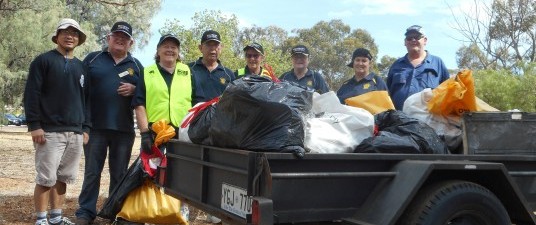Community Service
Rotarians have been deeply involved in serving their communities since the establishment of the first club. The history of every Rotary club contains a record of projects reflecting the third part of Rotary’s Object: “The application of the ideal of service in each Rotarian’s personal, business and community life.”
Policy Toward Community Service Activities
The policy of Rotary toward Community Service is set forth in the following statement adopted at the 1923 convention and amended at subsequent conventions. In Rotary, Community Service is to encourage and foster the application of the ideal of service in each Rotarian’s personal, business, and community life. In carrying out this application of the ideal of service many clubs have developed various Community Service activities as affording opportunities for service by their members. For the guidance of Rotarians and Rotary clubs and to formulate a policy for Rotary toward Community Service activities, the following principles are recognised and accepted as sound and controlling:
- Fundamentally, Rotary is a philosophy of life that undertakes to reconcile the ever present conflict between the desire to profit for one’s self and the duty and consequent impulse to serve others. This philosophy is the philosophy of service — “Service Above Self” — and is based on the practical ethical principle that “He profits most who serves best.”
- Primarily, a Rotary club is a group of representative business and professional people who have accepted the Rotary philosophy of service and are seeking:
First, to study collectively the theory of service as the true basis of success and happiness in business and in life; and
second, to give, collectively, practical demonstrations of it to themselves and their community; and
third, each as an individual, to translate its theory into practice in business and in everyday life; and
fourth, individually and collectively, by active precept and example, to stimulate its acceptance both in theory and practice by all non-Rotarians as well as by all Rotarians. - RI is an organisation that exists
- for the protection, development, and worldwide propagation of the Rotary ideal of service;
- for the establishment, encouragement, assistance, and administrative supervision of Rotary clubs; as a clearing house for the study of their problems and, by helpful suggestion but not compulsion, for the standardization of their practices and of such Community Service activities, and only such Community Service activities, as have already been widely demonstrated by many clubs as worthwhile and as are within, and will not tend to obscure, the Object of Rotary as set out in the RI constitution.
- Because they who serve must act, Rotary is not merely a state of mind, nor Rotary philosophy merely subjective, but must translate itself into objective activity; and the individual Rotarian and the Rotary club must put the theory of service into practice. Accordingly, corporate action by Rotary clubs is recommended under the safeguards provided herein. It is desirable that every Rotary club sponsor a major Community Service activity each fiscal year, varied from year to year if possible and to be completed if possible before the end of the fiscal year. This activity is to be based upon a real community need and should require the collective cooperation of all its members. This is to be in addition to the club’s continuing its program for the stimulation of the club members to individual service within the community.
- Each individual Rotary club has absolute autonomy in the selection of such Community Service activities as appeal to it and as are suited to its community; but no club should allow any Community Service activity to obscure the Object of Rotary or jeopardise the primary purpose for which a Rotary club is organised; and RI, although it may study, standardise and develop such activities as are general and make helpful suggestions regarding them, should never prescribe nor proscribe any Community Service activity for any club.
- Although regulations are not prescribed for an individual Rotary club in the selection of Community Service activities, the following rules are suggested for its guidance:
- Because of the limited membership of Rotary, only in a community where there is no adequate civic or other organisation in a position to speak and act for the whole community should a Rotary club engage in a general Community Service activity that requires for its success the active support of the entire citizenship of the community, and, where a chamber of commerce exists, a Rotary club should not trespass upon nor assume its functions, but Rotarians, as individuals committed to and trained in the principle of service, should be members of and active in their chambers of commerce and as citizens of their community should, along with all other good citizens, be interested in every general Community Service activity, and, as far as their abilities permit, do their part in money and service;
- As a general thing, no Rotary club should endorse any project, no matter how meritorious, unless the club is prepared and willing to assume all or part of the responsibility for the accomplishment of that which it endorses;
- While publicity should not be the primary goal of a Rotary club in selecting an activity, as a means of extending Rotary’s influence, proper publicity should be given to a worthwhile club project well carried out;
- A Rotary club should avoid duplication of effort and in general should not engage in an activity that is already being well handled by some other agency;
- A Rotary club in its activities should preferably cooperate with existing agencies, but where necessary may create new agencies where the facilities of the existing agencies are insufficient to accomplish its purpose. It is better for a Rotary club to improve an existing agency than to create a new and duplicative agency;
- In all its activities a Rotary club acts best and is most successful as a propagandist. A Rotary club discovers a need but, where the responsibility is that of the entire community, does not seek alone to remedy it but to awaken others to the necessity of the remedy, seeking to arouse the community to its responsibility so that this responsibility may be placed not on Rotary alone but on the entire community where it belongs; and while Rotary may initiate and lead in the work, it should endeavour to secure the cooperation of all other organisations that ought to be interested and should seek to give them full credit, even minimising the credit to which the Rotary club itself is entitled;
- Activities which enlist the individual efforts of all Rotarians generally are more in accord with the genius of Rotary than those requiring only the mass action of the club, because the Community Service activities of the Rotary club should be regarded only as laboratory experiments designed to train members of a Rotary club in service.
Vocational Service
Vocation refers to one’s “regular employment, calling, business, profession or occupation.” In the term “Vocational Service,” Rotary employs the word “service” in its broadest sense, referring not merely to the merchandise sold or work done in any business or professional transaction, but also to the giving of due consideration to the needs and circumstances of the one served and to the continual thoughtfulness of others.
Vocational Service is stressed in Rotary’s Object in these words:
“To encourage and foster high ethical standards in business and professions; the recognition of the worthiness of all useful occupations; and the dignifying of each Rotarian’s occupation as an opportunity to serve society.”
Statement on Vocational Service
Vocational Service is the way Rotary fosters and supports the application of the ideal of service in the pursuit of all vocations. Inherent in the Vocational Service ideal are:
- Adherence to, and promotion of, the highest ethical standards in all occupations, including faithfulness and fidelity to employers, employees, and associates, fair treatment of them and of competitors, the public, and all those with whom one has any business or professional relationships;
- The recognition of the worthiness to society of all useful occupations, not just one’s own or those which are pursued by Rotarians;
- The contribution of one’s vocational talents to the problems and needs of society. Vocational Service is both the responsibility of a Rotary club and of its members. The role of the club is to implement and encourage the objective by frequent demonstration, by application to its own actions, by example and by development of projects that help members contribute their vocational talents. The role of members is to con-duct themselves, their businesses and their professions in accordance with Rotary principles and to respond to projects which the club has developed.
Declaration for Rotarians in Businesses and Professions
The 1989 Council on Legislation adopted the following declaration for Rotarians in businesses and professions: As a Rotarian engaged in a business or profession, I am expected to:
Consider my vocation to be an-other opportunity to serve;
Be faithful to the letter and to the spirit of the ethical codes of my vocation, to the laws of my country, and to the moral standards of my community;
Do all in my power to dignify my vocation and to promote the highest ethical standards in my chosen vocation;
Be fair to my employer, employees, associates, competitors, customers, the public and all those with whom I have a business or professional relationship;
Recognize the honour and respect due to all occupations which are useful to society;
Offer my vocational talents: to provide opportunities for young people, to work for the relief of the special needs of others, and to improve the quality of life in my community;
Adhere to honesty in my advertising and in all representations to the public concerning my business or profession; Neither seek from nor grant to a fellow Rotarian a privilege or advantage not normally accord-ed others in a business or professional relationship.
Reproduction and Use of The 4-Way Test
All reproductions of The 4-Way Test should be in the following form:
THE 4-WAY TEST
Of the things we think, say or do
- Is it the TRUTH?
- Is it FAIR to all concerned?
- Will it build GOODWILL and BETTER FRIENDSHIPS?
- Will it be BENEFICIAL to all concerned?
The sole purpose of any reproduction or use of The 4-Way Test should be the development and maintenance of high ethical standards in human relations. Any reproduction should not be a direct part of any advertisement intended to increase sales or profits. It may, however, be used in a letterhead or literature, if done in a way to explain that a sincere attempt is being made to have all of the human relations of the firm, organization or institution con-ducted along the lines of The 4-Way Test.
When The 4-Way Test is reproduced as a part of or in connection with any-thing to be distributed by a Rotary club or group of clubs, the reproduction should be followed by reference to the club or group of clubs so as to appropriately associate the club(s) with the attempt being made to promote the conduct of all human relations along the lines of The 4-Way Test. The 4-Way Test should not be referred to as a “code” in any sense.
Vocational Guidance
The activity of assisting young people in the selection of careers is an activity of the club Vocational Service committee. It is suggested that clubs appoint a subcommittee on “Career Development” under the Vocational Service committee to, among other things, promote, in cooperation with the youth committee, the activity of assisting young people in the selection of careers.
Vocational Service Activities
Clubs should arrange at their own meetings and encourage other groups in their communities to present programs on cultural, economic and geographical conditions in other countries. The purpose of such programs is to help overcome possible difficulties arising from language barriers and differences in cultural and social back-grounds as a result of the mass movement of workers from one country to another. Clubs should consider taking steps to initiate or support citizens’ advisory bureaus for the purpose of assisting new arrivals in the community to assimilate into their new environment. The attention of members should be drawn to consideration of the extent to which the policies of states and governments depend upon negotiations and agreements between the leaders of trade associations and union leaders, and the consequent opportunity for club members to strive to play a leading part in their trade associations and thus to have the possibility of influencing the establishment of policies in this field. Rotary clubs are encouraged to establish communication with chambers of commerce and industry in their communities to explore service opportunities. When appropriate, clubs should develop service projects which would be more productive if undertaken jointly. Such projects might include employee training, post-retirement service opportunities, functional literacy programs, workplace drug abuse prevention and treatment programs, employment counselling and vocational recognition programs. The dimensions of Vocational Service are limited only by the imagination and ingenuity of clubs and Rotarians. Because Rotarians are classified in their clubs on the basis of their vocations, Vocational Service is an essential element in the execution of all Rotary programs; its effect is felt throughout the other Avenues of Service. The RI Board urges clubs to obtain the advice of legal or liability insurance counsel with respect to the need for protection against liability resulting from Vocational Service activities, including the desirability of securing insurance or implementing other risk management practices as appropriate.
Rotary Volunteers
The Rotary Volunteers program was established to create greater awareness among Rotarians of the volunteer opportunities within Rotary-sponsored service projects as well as worthy projects of other organizations. The program assists clubs and districts in identifying those volunteers possessing expertise and skills unavailable locally, who can help in the completion of those service projects. Rotarians and spouses with Rotarians, as well as Rotaractors, Foundation alumni and non-Rotarians (where Rotarians are not immediately available) may participate in the program. The RI Board has established a limit of up to one percent of the total number of Rotarians in any district who may serve as registered Rotary Volunteers. In addition, Volunteers are expected to have a proven level of professional and technical skill and should be a minimum of 25 years of age. Club presidents and governors should appoint Rotary Volunteer sub-committees within Vocational Service committees to enhance the use of services of Rotarians and non-Rotarians as Rotary Volunteers as well as the development of projects in which Rotary Volunteers can be utilized. RI maintains a registry which serves as an information resource for individual Rotarian and non-Rotarian volunteers and possible community and international service sites, as well as a resource list of organisations that place, train or fund volunteers. Rotarians, Foundation alumni and Rotaractors serving as international volunteers between four to eight weeks may apply to the “Grants for Rotary Volunteers” program of The Rotary Foundation.
Vocational Service Month
The RI Board has established “Vocational Service Month” to be observed annually in October as a special month devoted to Vocational Service, to emphasise the involvement of clubs, and not just individual Rotarians, in the everyday practice of the ideals of Vocational Service. Specific activities recommended to clubs during “Vocational Service Month” are:
- The recognition of a Rotary Volunteer at a district-level event;
- Promotion of involvement in Rotary Recreational and Vocational Fellowships;
- Sponsorship of a Vocational Service activity or project; and
- Promotion of membership development in open classifications.
Business and Professional Relations Among Rotarians
The policy of Rotary with regard to business and professional relations among Rotarians is that a Rotarian should not expect, and far less should a Rotarian ask for, more consideration or advantages from a fellow Rotarian than the latter would give to any other business or professional associate. As an obligation to competitors and in the spirit of Vocational Service, a Rotarian shall not grant to a fellow Rotarian privileges that would not normally be accorded to others with whom the Rotarian has a business or professional relationship. Any use of the fellowship of Rotary as a means of gaining an advantage or profit is contrary to the spirit of Rotary. No commercial firm should sign letters “Yours Rotarily.
International Service
The Purpose of International Service
The development of understanding and goodwill among Rotarians and among the people at large is the specific task of International Service in Rotary.
Basic Policy of Rotary in International Service
The aim of International Service in Rotary is expressed in the fourth Avenue of Service; namely, to encourage and foster the advancement of international understanding, goodwill and peace through a world fellowship of business and professional persons united in the ideal of service. Freedom, justice, truth, sanctity of the pledged word, and respect for human rights are inherent in Rotary principles and are also vital to the maintenance of international peace and order and to human progress.
In concept, International Service can be broken down into four general areas as follows:
World Community Service Activities;
International Educational and Cultural Exchange Activities;
Special International Observances and Events;
International Meetings.
Responsibility of the Individual Rotarian
Each Rotarian is expected to make an individual contribution to the achievement of the ideal inherent in the fourth Avenue of Service. Each Rotarian is expected to be a loyal and serving citizen. Each Rotarian, wherever located, working as an individual, should help to create a well-informed public opinion. Such opinion will inevitably affect governmental policies concerned with the advancement of international understanding and goodwill toward all peoples.
A world-minded Rotarian:
will look beyond national patriotism and share responsibility for the advancement of international understanding, goodwill and peace;
will resist any tendency to act in terms of national or racial superiority;
will seek and develop common grounds for agreement with peoples of other lands;
will defend the rule of law and order to preserve the liberty of the individual so that all may enjoy freedom of thought, speech, and assembly, freedom from persecution and aggression, and freedom from want and fear;
will support action directed towards improving standards of living for all peoples, realising that poverty anywhere endangers prosperity everywhere;
will uphold the principles of jus-tice for mankind, recognising that these are fundamental and must be worldwide;
will strive always to promote peace between nations and will be prepared to make personal sacrifices for that ideal;
will urge and practice a spirit of understanding of every other person’s beliefs as a step towards international goodwill, recognising that there are certain basic moral and spiritual standards which, if practiced, will ensure a richer, fuller life.
Responsibility of the Rotary Club
Rotary clubs should not engage in any corporate effort to influence governments, world affairs, or international policies, but should encourage the development of an enlightened and constructive attitude in each Rotarian.
A Rotary club may properly provide a forum for the presentation of public questions where such a course of action is designed to foster the fourth Avenue of Service. Where such questions are controversial, it is essential that both sides be adequately presented.
The policy of RI does not preclude a balanced program of discussion in Rotary clubs of international issues, including the nuclear age and international trade, which are appropriate subjects for serious thought and debate within the framework of the pursuit of peace.
When international subjects are presented and discussed in a Rotary club, the speaker should be cautioned to avoid giving offences to peoples of other countries and it should be made clear that a Rotary club does not necessarily assume responsibility for opinions expressed by individual speakers at its meetings.
A Rotary club should not adopt resolutions of any kind dealing with specific plans relating to international affairs. It should not direct appeals for action from clubs in one country to clubs, peoples or governments of another country or circulate speeches or proposed plans for the solution of specific international problems.
In all cases where international tensions develop between countries in which Rotary clubs exist, the utmost caution should be exercised by the clubs of the countries concerned and by clubs of other countries lest any action may increase ill will and misunderstanding.
Rotary clubs and Rotarians are urged to intensify their efforts to encourage and foster the advancement of under-standing and goodwill among peoples of the world — at all times observing established policy of RI and avoiding scrupulously any act, utterance, correspondence or published statement which might have a tendency to cause misunderstanding, create ill will, or retard efforts to achieve and maintain peace.
Rotary International and International Service
Since RI consists of Rotary clubs located in many countries with many points of view, no corporate action or corporate expression on a political subject will be taken or given by RI. However, RI, through its member clubs worldwide, encourages and fosters international understanding and goodwill among peoples as a basis for peace among nations.
Criticisms of Laws and Customs of a Country
In the development of understanding and goodwill among Rotarians, it must be recognised that there may be many things that are illegal in one or more countries, although they may be legal in other countries. There are also practices that are customary in some countries, which may not be customary in other countries. Rotarians should avoid criticism of and interference with the laws or customs of other countries.





